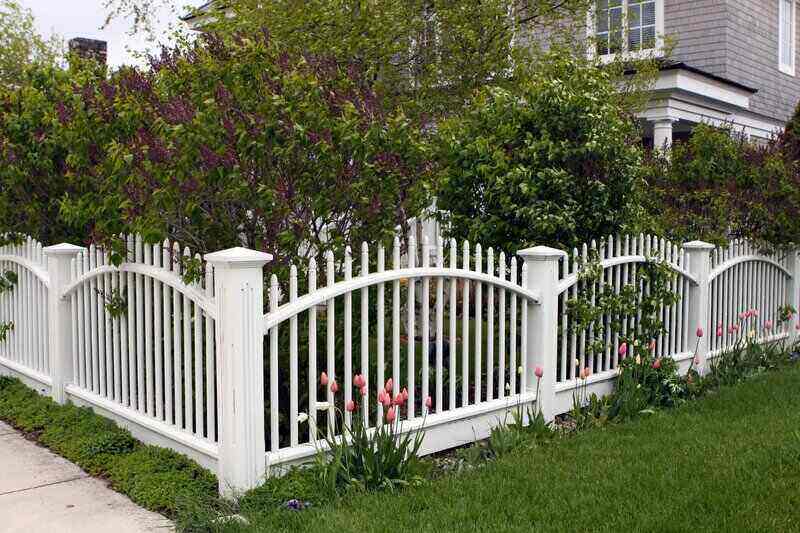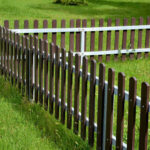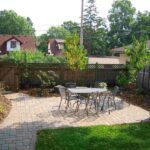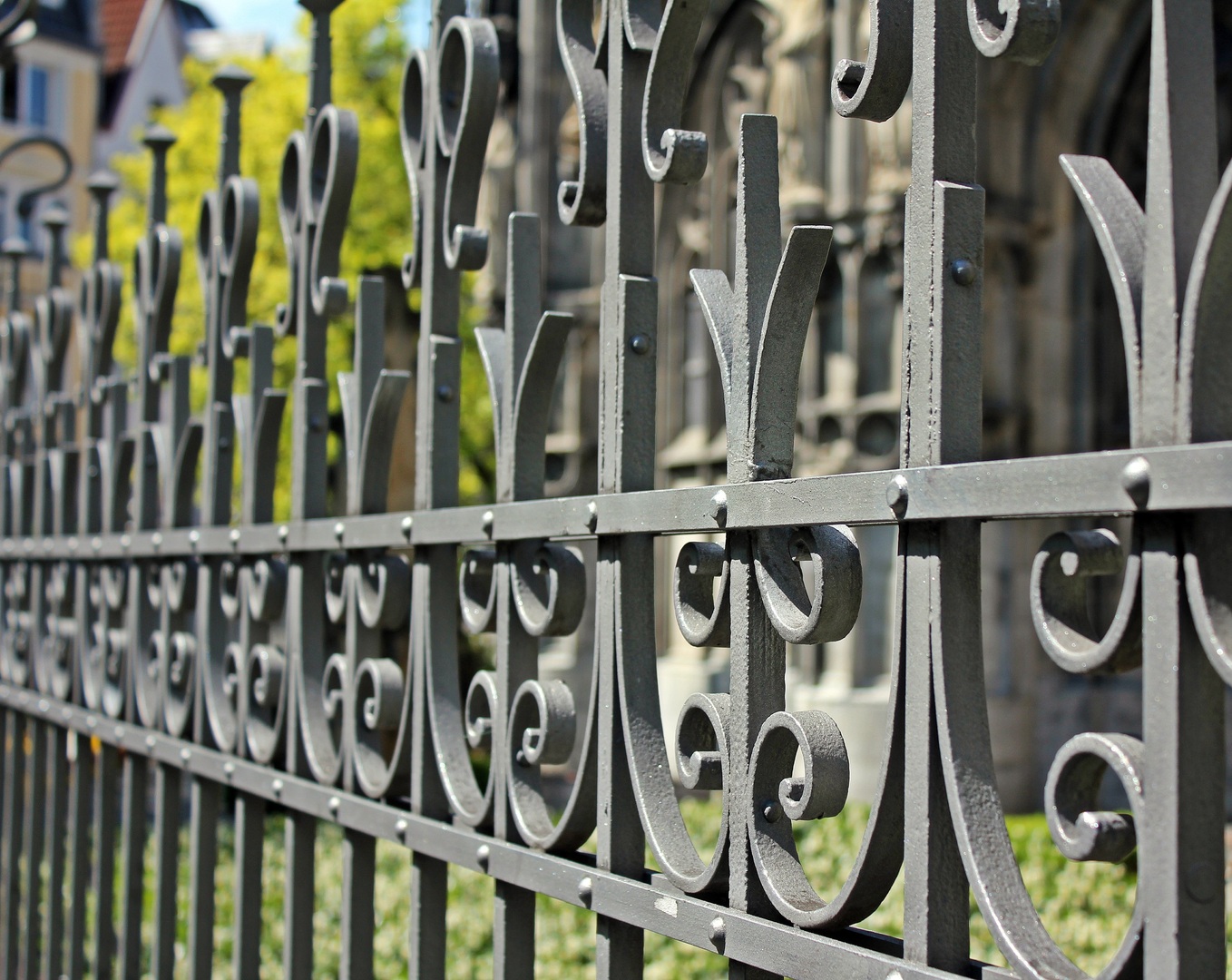
What comes to mind when you think of metal fencing? Is it chain-link fences, or maybe wrought iron fences? There may be more different types of metal fencing than you realize. While they’re all strong and long-lasting, these eight types of metal fencing are appealing in different ways.
We’ll explain the different metals and designs used for fencing so you can choose the best one for your yard. We’ll also review each type’s costs, benefits, and drawbacks.
8 Types of Metal Fencing
1. Wrought Iron Fences
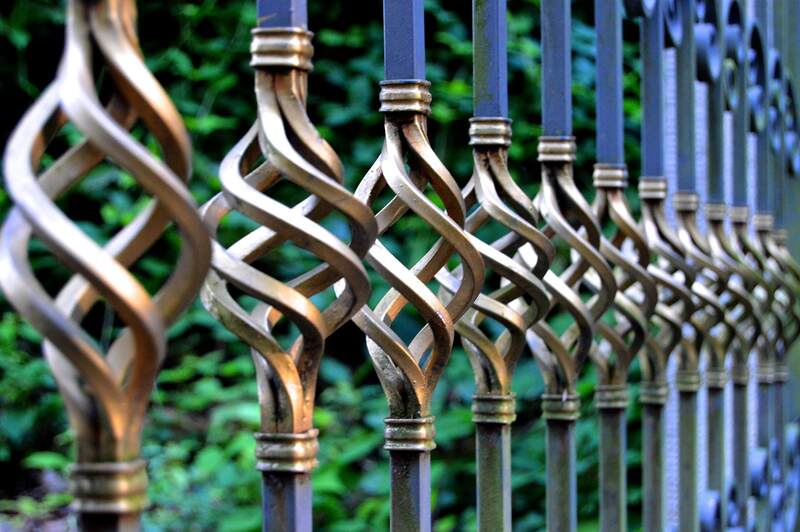
Wrought iron is a classic fencing design made by heating iron and forming it into various shapes. This labor-heavy process drives up the price but allows for endless customization options. These elegant fences have graced yards for centuries, and there are several styles to suit your tastes, such as:
- Flat top
- Arched top
- Fleur-de-lis
- Spearhead
- Ball top finish
- Closed iron
- Straight top
- Ornamental
Wrought iron is suitable for functional or decorative purposes because of its durability and design. It can keep dogs in as long as your pet can’t squeeze through the pickets. Choose from various powder-coated colors to suit your outdoor decor. Powder-coating also improves resistance to scratches and rust.
You may not know that many wrought iron fences aren’t technically wrought iron. Cast iron fences are a popular alternative since they’re cheaper. Cast iron is poured into a mold rather than wrought into shape using tools. Cast iron is more brittle than wrought iron, meaning it’s more likely to break under pressure.
Other materials like steel are sometimes advertised as wrought iron because of the similar style. However, many willingly choose these alternatives because they’re cheaper and provide enough strength and visual appeal for the average homeowner.
Pros:
- Durable
- Visually appealing
- Custom design options
- Secure
Cons:
- Expensive
- Hard to install
- Provide no privacy
- Susceptible to rust and corrosion if not powder-coated, painted, or sealed regularly (especially in coastal climates)
Cost: $26-$34 per linear foot
2. Aluminum Picket Fences
Is rust your biggest concern? Aluminum fences are naturally rust-resistant, making them great pool fences. These lightweight fences are generally less expensive than wrought iron fences. While most aluminum fences are simply designed with a top rail, bottom rail, and pickets, some are modeled after the more stylistic wrought iron designs. You also can select from various powder-coated colors.
Are you worried your little furry friend will squeeze between the pickets? Install puppy pickets onto your aluminum fence to make the gaps smaller. This addition is an excellent solution for puppies or small dogs. However, aluminum may not be secure enough to stop human intruders. If you install it with screws, a trespasser could unscrew them to get inside.
While aluminum fences are lower maintenance than wrought iron, they’re not as strong. Aluminum fences can bend if hit by objects like storm debris. Ask your local fence expert for a higher-grade aluminum for a stronger fence, but understand it will cost more.
Pros:
- Low-maintenance
- Cost-effective
- Many styles and color options
- Recyclable
Cons:
- Compromised security and durability
- Provide no privacy
Cost: $19-$76 per linear foot
3. Steel Picket Fences
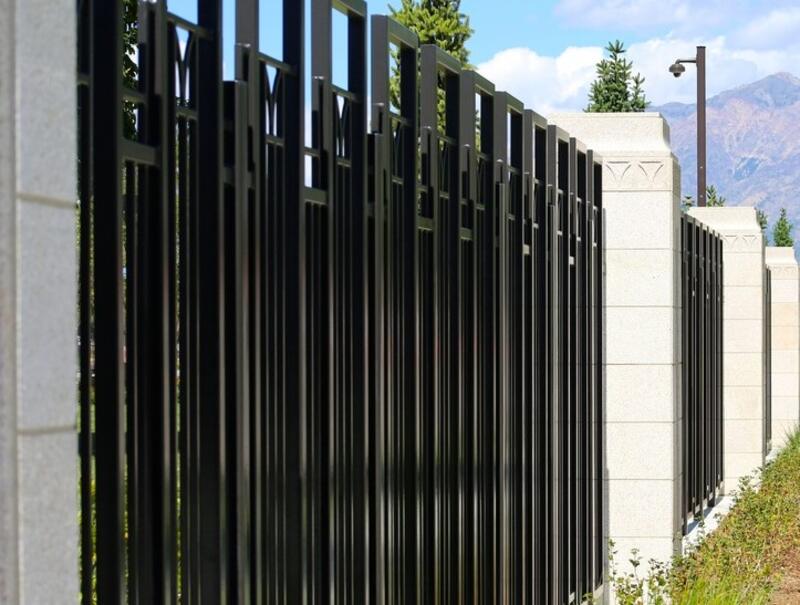
Remember how companies often use steel for wrought “iron” fences? That’s because steel fencing is more affordable than wrought iron and comes in many of the same styles. It can either be welded together or joined with rivets.
However, steel is heavy and difficult to install. This feature makes it a less-than-ideal choice for DIYers, though a pro can handle it just fine. Steel fences aren’t rust-proof, but galvanized steel can resist corrosion.
Pros:
- Comes in many styles
- Adds value to homes
- Galvanized steel can resist corrosion
Cons:
- Heavy and hard to install
- Not resistant to rust unless it’s galvanized
- Provide no privacy
Cost: $23-$45 per linear foot
4. Chain-Link Fences
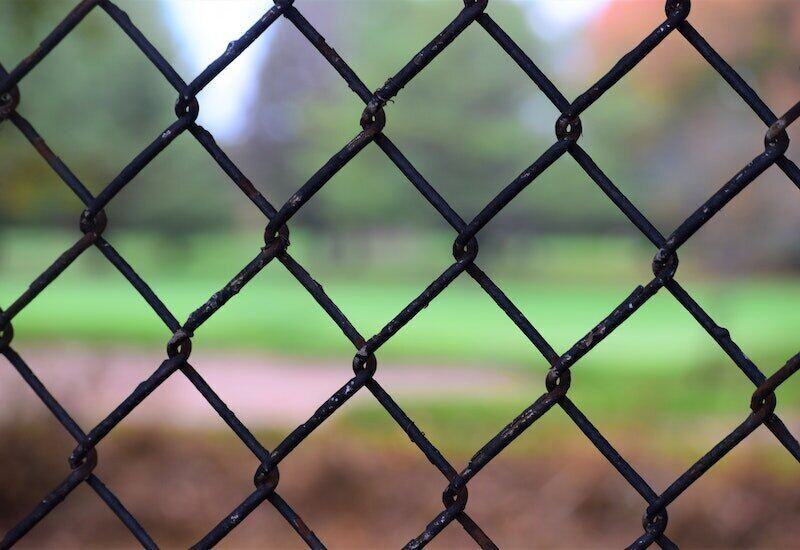
Not so worried about appearances? Chain-link fences are practical and affordable, making them a popular fence choice among homeowners and business owners. They’re also popular for dog owners since this fencing has no gaps and can be tall enough to stop high-jumping dogs. Choose from galvanized steel, stainless steel, aluminum, or vinyl-coated varieties in various colors.
Because of its lackluster appearance, chain-link fencing is one of the few metal fence types that doesn’t increase property value. However, there are some ways to customize your chain-link fence or make it private.
The security of chain-link is often overstated; while it keeps most children and pets contained, a human intruder could easily climb or cut through it. You may be able to install barbed wire on top, but many residential areas forbid it for safety reasons.
Pros:
- Budget-friendly
- Low maintenance
- Easy to install and repair
- Great for dog runs
Cons:
- Provide no privacy unless you install slats
- Not secure
- Not visually appealing
- Doesn’t increase property value
Cost: $12-$33 per linear foot
5. Wire Fences
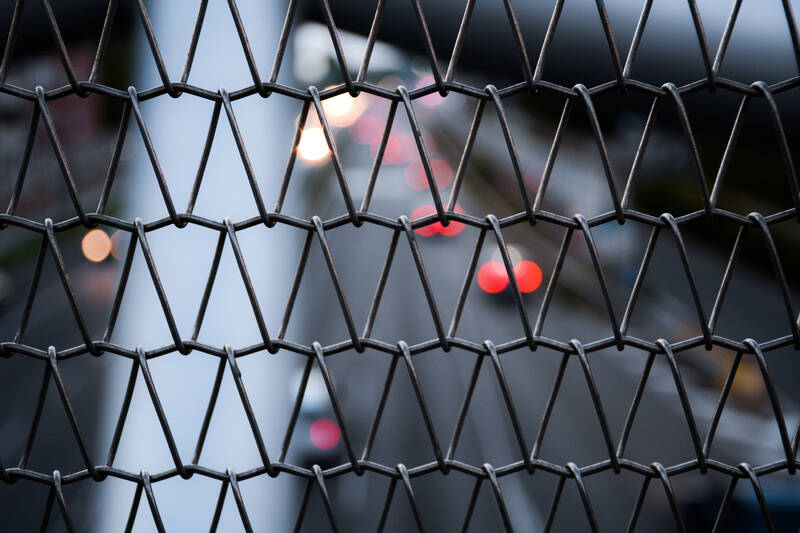
Want security on a budget? Wire fences are one of the cheapest fence types and effectively keep animals in or out, making them perfect for gardens. They’re also easy to install and repair. Wire fences range in complexity from simple wires strung between posts to wire mesh in frames. Here are the most common styles:
- Chicken wire
- Hog wire
- Welded wire
- Barbed wire
- Razor wire
Wire fencing isn’t the most aesthetically pleasing style, though a wooden frame may boost its visual appeal. Barbed and razor wire are forbidden in many residential areas, so check your local regulations before installing.
Pros:
- Budget-friendly
- Easy to install and repair
- Secure for gardens and animal enclosures
Cons:
- Not visually appealing
- Some types are not allowed in residential areas
Cost: $3-$5 per linear foot
6. Aluminum Slat Fences
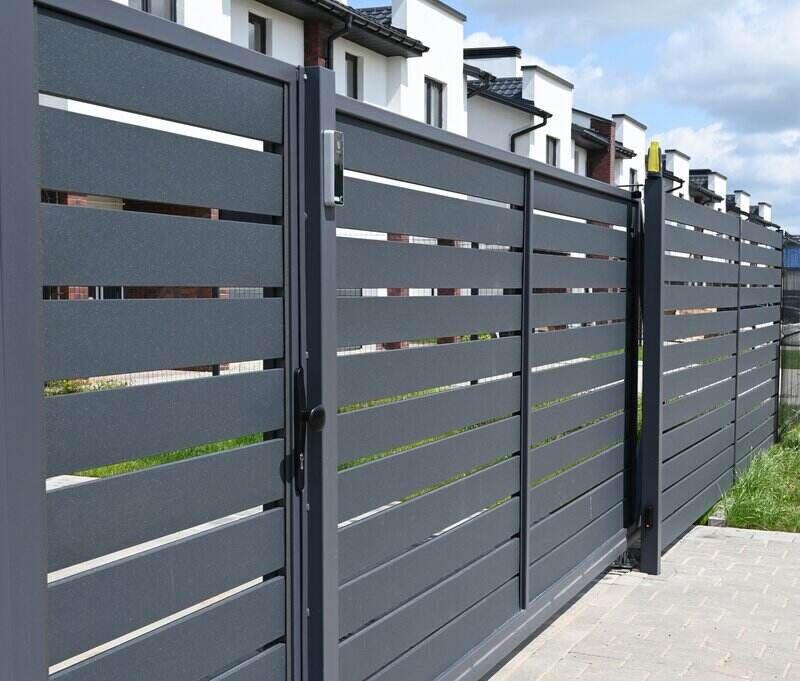
Do you like the appearance of wooden slat fences but want more durability? Install aluminum slat fencing instead. It has the same private or semi-private appearance but won’t be vulnerable to termites. Choose from several colors to match your decor.
Like aluminum pickets, aluminum slat fences are resistant to rust but prone to denting when hit by objects. They also can get quite pricey compared to other styles because of the amount of material needed. Metal slat fences are available as DIY kits at many home improvement stores.
Pros:
- Provides privacy
- Comes in many colors
- DIY-friendly
- Rust-proof
Cons:
- Expensive
- Prone to denting
Cost: $63-$70 per linear foot
7. Corrugated Metal Fences
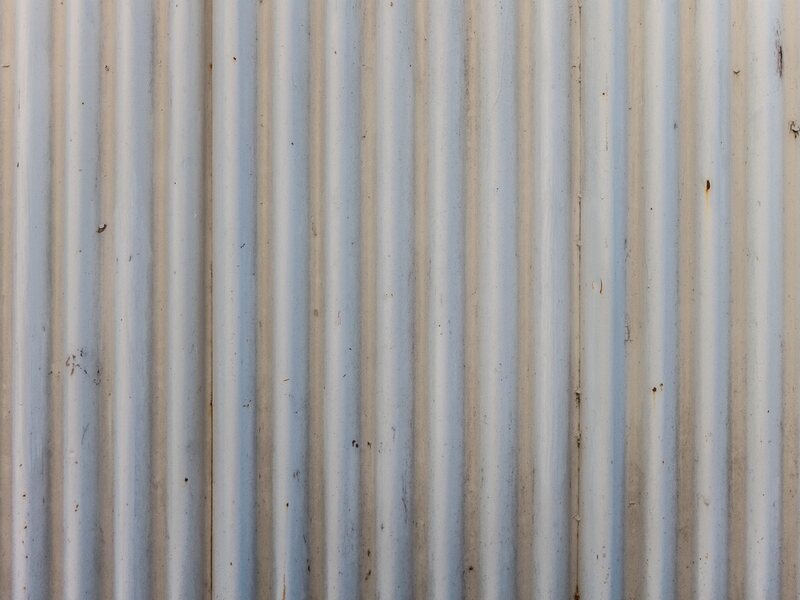
Want even more privacy? A corrugated metal fence provides complete privacy and is DIY-friendly. For a fun modern design, combine corrugated metal panels with wood panels. Most corrugated metal fences are made with galvanized steel to resist rust. They also are eco-friendly since they’re recyclable.
This fence style can add a modern or rustic look to your yard, but not everyone finds it visually appealing. Though you could always paint or cut them, they don’t come in many shapes or styles. They could also have sharp edges, making them dangerous for children. Corrugated metal can make sound echo in a yard, so they’re not a good acoustic fencing option.
Pros:
- Provide privacy
- DIY-friendly
- Can be combined with wooden fencing
- Rust-resistant if they’re made of galvanized steel
- Eco-friendly
Cons:
- Debatable aesthetic appeal
- Sharp edges
- Limited color and shape options
Cost: $7-$13 per linear foot
8. Metal Privacy Screen Fences
If you like decorative fences but aren’t a fan of pickets, metal privacy screens may suit your needs. These fences have intricate shapes cut out to boost the aesthetics of your outdoor space. They provide privacy while still letting some light through. You can purchase metal privacy screens from home improvement stores.
However, many metal privacy screen fences are only for aesthetic purposes. They come with stand poles rather than fence posts that you can set in the ground. This feature makes them less than ideal for security purposes. You may need a professional to install a metal privacy screen that’s firmly rooted in the ground. They are also expensive because of the materials and designs, so they’re best for small areas.
Pros:
- Aesthetically appealing
- Provide privacy
- Let light through
Cons:
- Expensive
- Not always secure
Cost: $20-$66 per linear foot
Things to Consider Before Choosing a Metal Fence
Maybe you can’t decide on a metal fence style or aren’t sure if you want metal at all. Here are some factors to consider before you choose.
- Cost: While ornamental metal is the most expensive fence type, some of the most budget-friendly options, like wire and chain-link, are also made of metal.
- Aesthetic Appeal: Metal fences range from plain to gorgeous. However, the work it takes to make metal beautiful comes with a high price tag.
- Visibility and Privacy: Most metal fences have excellent visibility, which is ideal for situations where you don’t want to block your view. However, there are only a few privacy options for metal fences. You may be able to make some metal fences private with slats, screens, or other items, but metal fences with built-in privacy tend to be expensive.
- Security: Metal fences are secure enough to keep pets and children contained. However, you’ll need to be mindful of their height and gaps between pickets. Select a metal fence that isn’t easy to climb or has spikes on top to prevent trespassing.
- Durability: While masonry is the strongest fence type, metal follows close behind. Iron is the strongest metal for fences, while aluminum is the weakest. However, even the weakest metal fence is stronger and lasts longer than a wooden or vinyl fence (when well taken care of).
- Landscaping: Sometimes, nature interferes with your fencing plans. If your lawn has bodies of water, you’ll need to ensure your fencing material won’t rust from the extra moisture. Aluminum and chain-link fences are good choices if you have a sloped yard since you can adjust them to follow the land’s design.
- Ease of Installation: You can build wire, chain-link, corrugated metal, aluminum slat, and aluminum picket fencing yourself from scratch or with kits from home improvement stores. However, other metal fencing types can be heavy or require welding, making them best handled by a professional.
- Maintenance Needs: No fencing is 100% maintenance-free, but metal fencing requires less maintenance than other fencing materials. If the specific metal you use is prone to rust, you’ll need to paint or seal it regularly. Any metal fencing will need occasional washing to remove dirt. Keep metal fences dry to decrease the chance of rust.
- Ease of Repair: Chain-link and wire fences are simple to repair — all you need to do is cut off the damaged portion and attach new wire or chain-link mesh. Other metal fencing types will need whole panels replaced if they’re damaged. You may need a fencing contractor’s help to repair them.
FAQ About the Types of Metal Fencing
Chain-link fencing is best for dogs because:
● It doesn’t have gaps for small dogs to squeeze through
● You can build it tall so dogs can’t jump over
● You can install it with a concrete base so your dog can’t dig underneath
● You can add privacy slats or screens to block the view of excitable dogs
● It’s affordable for large dog runs
Aluminum fences are also great because you can install puppy pickets to keep small dogs contained. Install a tall aluminum fence for large or high-jumping dogs.
Aluminum, galvanized steel, or powder-coated won’t rust. Vinyl-coated chain-link fences are also protected from rust.
To minimize the chance of corrosion:
● Paint or coat your existing metal fence
● Remember that coated metals can rust if the protective layer is scratched
● Look for damage regularly so you can reapply the protective coating
The strength of iron fences makes them long-lasting if they’re correctly maintained. Some wrought iron fences are still standing after hundreds of years. Aluminum fences are the next best choice if you want something lower maintenance. They can last for decades because of their rust resistance.
When to Hire a Pro
You can DIY some types of metal fencing, but many types are just too complicated to install for the typical homeowner. If you are the typical homeowner, you should get a quote from a local fencing contractor. They can help you navigate all the fencing products on the market and choose the best one. They also can tear down your existing fence and haul away materials.
Main Image Credit: Pxhere
